I have been asked many times if hard anodized cookware is compatible with induction cooktops. The answer is not straightforward as it depends on the specific cookware set.
Hard anodized cookware is made from aluminum that has been treated with an electrochemical process, which makes it durable and non-reactive. However, not all hard anodized cookware sets are compatible with induction cooktops.

Induction cooktops use an electromagnetic field to heat up the cookware directly, so the cookware must be made of a magnetic material. Most hard anodized cookware sets are not magnetic and are therefore not compatible with induction cooktops.
However, some manufacturers have started producing hard anodized cookware with a magnetic stainless steel base, making them compatible with induction cooktops.
It is important to check the manufacturer’s specifications before purchasing a hard anodized cookware set if you plan to use it on an induction cooktop.
Key Takeaways
- Not all hard anodized cookware sets are compatible with induction cooktops.
- Induction cooktops require cookware made of a magnetic material.
- Some manufacturers produce hard anodized cookware with a magnetic stainless steel base, making them induction compatible.
Understanding Hard Anodized Cookware
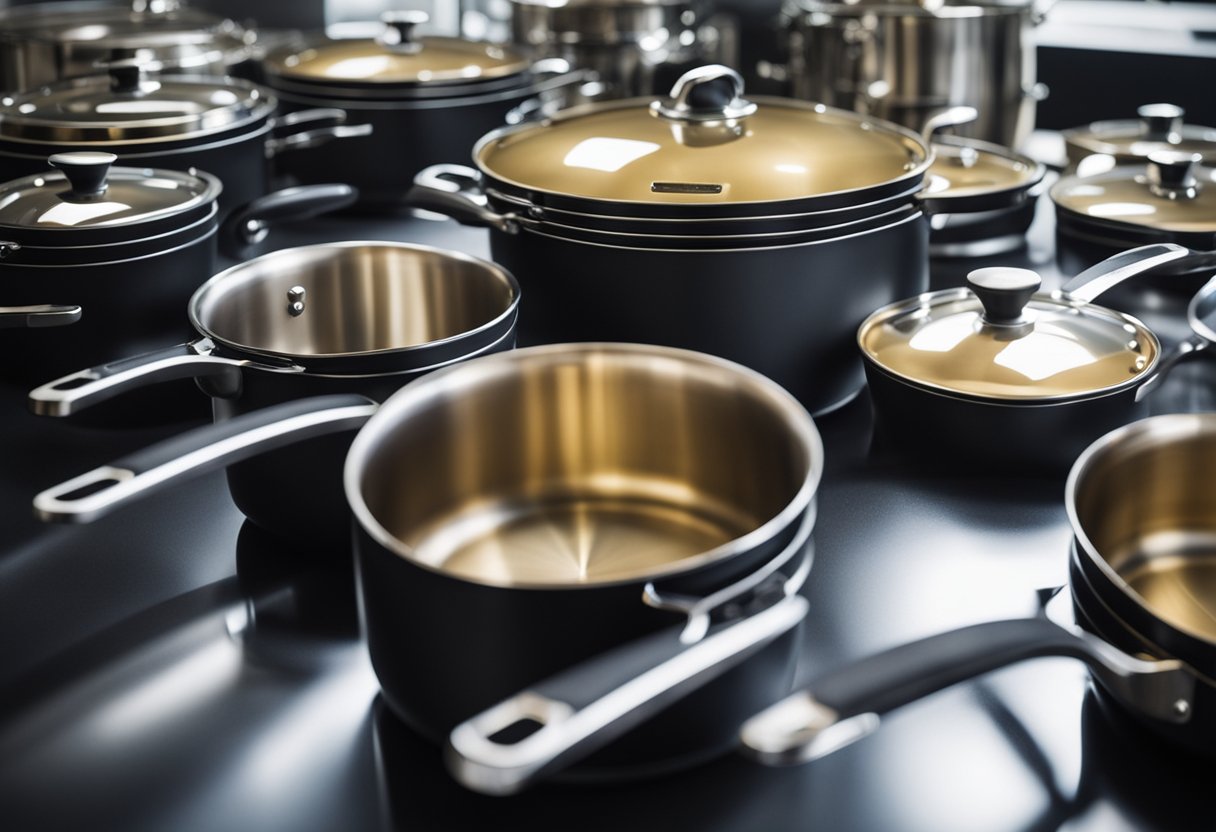
As someone who has used hard anodized cookware extensively, I can confidently say that it is a popular choice among home cooks and professional chefs alike.
Hard anodized cookware is made from aluminum that has been subjected to an electrochemical process called anodization. This process creates a hard, non-reactive surface that is resistant to corrosion and scratches.
The anodization process involves immersing the aluminum in a chemical bath and passing an electric current through it. This causes the surface of the aluminum to oxidize, creating a layer of aluminum oxide that is harder and more durable than the underlying metal.
The resulting hard-anodized aluminum is non-stick, scratch-resistant, and can withstand high temperatures without warping.
One of the main advantages of hard anodized cookware is its durability. The anodized surface is resistant to scratches and corrosion, which means that the cookware will last longer than other types of aluminum cookware.
Additionally, the non-stick coating on hard anodized cookware makes it easy to clean and prevents food from sticking to the surface.
However, it is important to note that not all hard anodized cookware is compatible with induction cooktops. Induction cooktops require a ferromagnetic material at the bottom of the cookware to generate heat.
Most hard anodized cookware is made of aluminum, which is not magnetic and therefore not compatible with induction cooktops.
Some companies make hard anodized cookware with a magnetic stainless steel base that is compatible with both induction and traditional cooktops.
If you plan on using hard anodized cookware on an induction cooktop, make sure to check if the cookware has a magnetic base before purchasing.
In summary, hard anodized cookware is a durable and long-lasting option for home cooks and professional chefs.
Its non-stick surface and scratch-resistant coating make it easy to clean and maintain. However, it is important to ensure that the cookware is compatible with your cooktop before purchasing.
Induction Cooktops Explained
As someone who enjoys cooking, I have always been interested in learning about different types of cookware and cooktops. Induction cooktops are a relatively new technology that has gained popularity in recent years due to their efficiency and precision.
Induction cooktops use a magnetic field to generate heat directly in the cookware itself, rather than through a heating element like traditional cooktops.
This means that only cookware made of ferromagnetic materials, such as cast iron or some types of stainless steel, can be used on induction cooktops.
One of the benefits of using an induction cooktop is its temperature control. The cooktop can be adjusted to a precise temperature, which allows for more accurate cooking.
Additionally, induction cooktops are more efficient than traditional cooktops because they only heat the cookware, not the air around it. This means that less energy is wasted, and cooking times can be reduced.
Induction cooktops use an electromagnetic coil to create the magnetic field that generates the heat. This coil is located beneath the glass surface of the cooktop.
When the cookware is placed on the cooktop, the magnetic field induces an electric current in the cookware, which generates heat.
Overall, induction cooktops are a great option for those who want efficient and precise cooking. However, it is important to note that not all cookware is compatible with induction cooktops.
Cookware made of non-magnetic materials, such as aluminum or copper, will not work on induction cooktops. If you are considering purchasing an induction cooktop, it is important to ensure that your cookware is compatible.
Compatibility of Hard Anodized Cookware with Induction Cooktops
As someone who enjoys cooking, I know how important it is to have the right cookware for the job. One question that often comes up is whether hard anodized cookware is compatible with induction cooktops.
The answer is not a simple yes or no, as it depends on the specific type of hard anodized cookware you have.
Most hard anodized cookware is not compatible with induction cooktops because it is not made with a magnetic material. Induction cooktops require a ferromagnetic material at the bottom of the cookware to work properly.
Hard anodized cookware is typically made of aluminum that has been treated with a chemical process to make it harder and more durable. However, there are some hard anodized cookware sets that are specifically designed to work on induction cooktops.
If you are shopping for hard anodized cookware and plan to use it on an induction cooktop, look for sets that have a stainless steel base or an induction symbol on the packaging.
These are indicators that the cookware is compatible with induction cooktops. Stainless steel is a ferromagnetic metal, so cookware with a stainless steel base will work on induction cooktops.
It’s important to note that not all stainless steel cookware is compatible with induction cooktops. Look for cookware that specifically states it is induction compatible, or check if a magnet will stick to the bottom of the cookware.
If a magnet sticks, the cookware is ferromagnetic and will work on an induction cooktop.
In summary, most hard anodized cookware is not induction compatible, but there are some sets that are designed to work on induction cooktops.
Look for cookware with a stainless steel base or an induction symbol on the packaging to ensure compatibility. Remember to check if the cookware is specifically labeled as induction compatible or if a magnet will stick to the bottom to ensure it is made of a ferromagnetic material.
Performance of Hard Anodized Cookware on Induction Cooktops
As an avid home chef, I’m often asked about the performance of hard anodized cookware on induction cooktops. Hard anodized cookware is usually made of chemically treated aluminum, which is not magnetic and therefore not compatible with induction cooktops.
However, there are some hard-anodized cookware sets that are specifically designed to work on induction.
One of the main benefits of using hard anodized cookware on an induction cooktop is that it provides even heating.
Induction cooktops use electromagnetic energy to heat the cookware directly, which means that the heat is evenly distributed across the bottom of the cookware. This results in more precise temperature control and better cooking performance.
Another advantage of using hard anodized cookware on an induction cooktop is that it heats up quickly.
Since the heat is transferred directly to the cookware, there is no need to wait for the cooktop to heat up before you start cooking. This can save you time in the kitchen and make it easier to cook meals quickly.
It’s also worth noting that some hard-anodized cookware sets come with a non-stick coating, which can make cooking and cleaning even easier. The non-stick surface prevents food from sticking to the cookware, which means that you can cook with less oil and clean up more quickly.
In summary, hard anodized cookware can work on induction cooktops if it is specifically designed to do so. The performance of hard anodized cookware on induction cooktops is excellent, providing even heating, precise temperature control, and quick heat-up times.
If you’re in the market for new cookware and have an induction cooktop, consider investing in a set of hard-anodized cookware that is compatible with your cooktop for optimal performance in the kitchen.
Safety and Maintenance of Hard Anodized Cookware
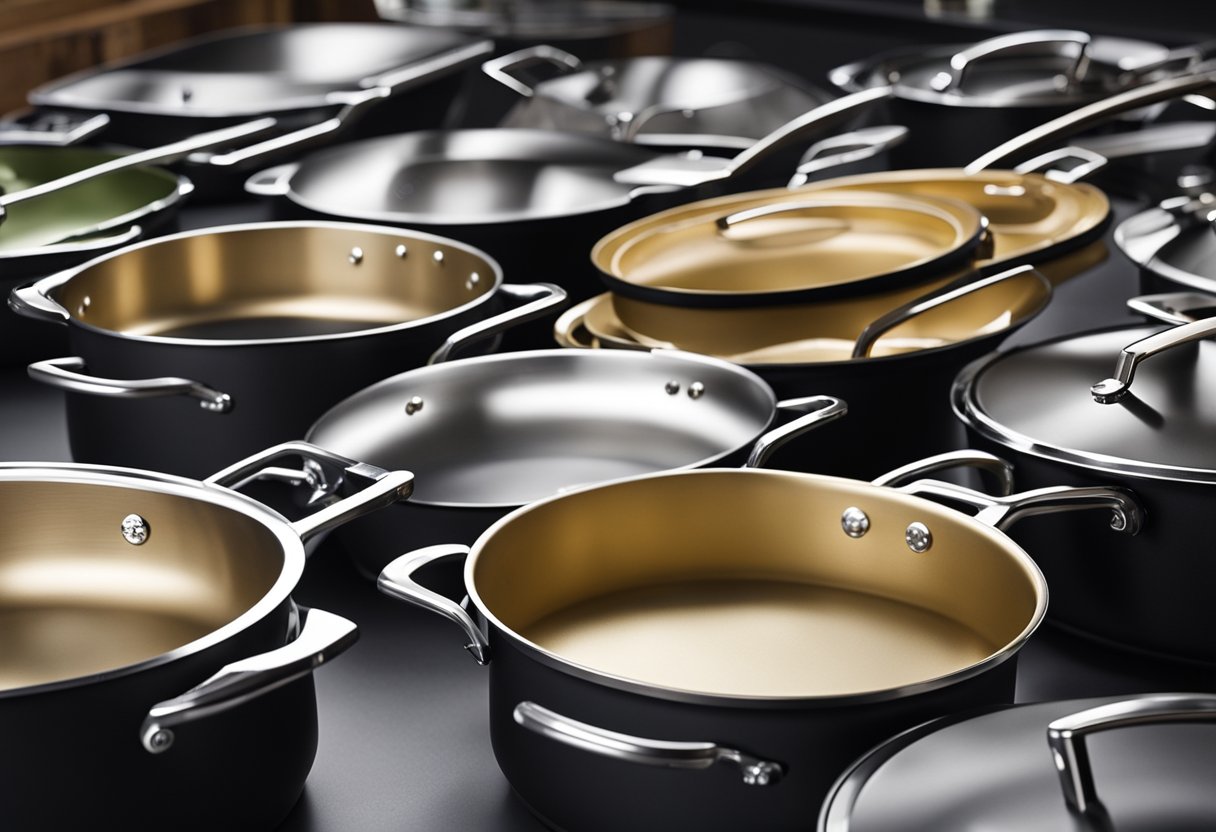
As someone who has used hard anodized cookware for years, I can confidently say that it is a safe and durable option for your kitchen. The electrochemical process used to create the hard anodized surface makes it scratch-resistant and non-toxic.
This means that even with regular use, you do not have to worry about the surface flaking off and contaminating your food.
In terms of cleaning and maintenance, hard anodized cookware is relatively easy to clean. It is recommended to hand wash the cookware with mild dish soap and a non-abrasive sponge to preserve the surface.
While some hard anodized cookware is dishwasher safe, it is best to check the manufacturer’s instructions before putting it in the dishwasher.
One thing to note is that hard anodized cookware is not compatible with induction cooktops unless it has a ferromagnetic base. Induction cooktops work by creating an electromagnetic field that heats up the cookware, and hard anodized cookware is not magnetic.
However, some brands do make hard anodized cookware with a ferromagnetic base, so be sure to check the label before purchasing.
Overall, hard anodized cookware is a safe and reliable option for your kitchen. With proper care and maintenance, it can last for years and provide you with a durable cooking surface that is easy to clean and maintain.
Popular Brands and Cookware Sets
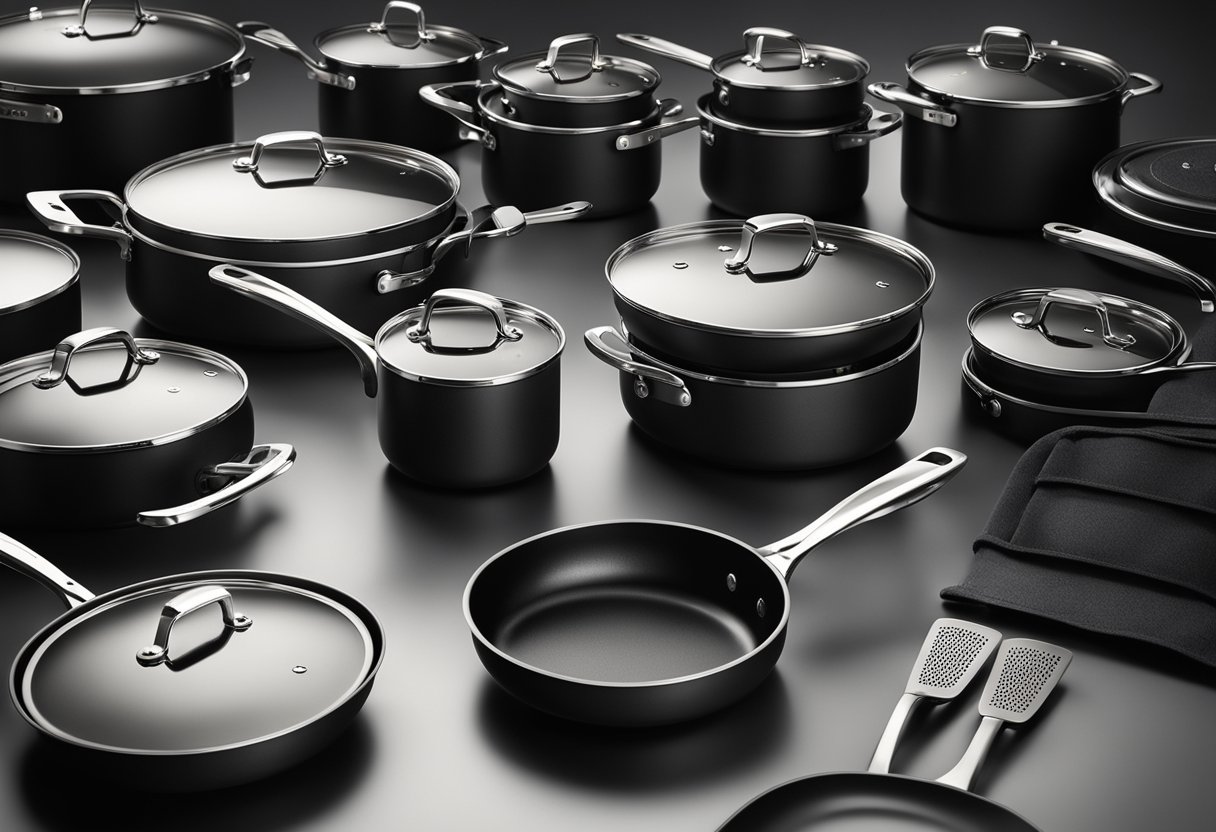
When it comes to hard-anodized cookware, there are several popular brands and cookware sets to choose from. Some of the most well-known brands in this category include Calphalon, Circulon Symmetry, and Anolon.
Calphalon offers a wide range of hard-anodized cookware sets, including their best-selling Calphalon Premier Space-Saving Nonstick 15-Piece Set. This set includes a variety of pots, pans, and utensils, all of which are designed to be space-saving and easy to store.
The hard-anodized aluminum construction ensures even heating and durability, while the nonstick surface makes for easy food release and cleanup.
Circulon Symmetry is another popular brand that offers a range of hard-anodized cookware sets. Their Circulon Symmetry Hard Anodized Nonstick 11-Piece Cookware Set is a great option for those looking for a complete set that includes a variety of pots and pans.
The set features the brand’s signature TOTAL Nonstick System, which is designed to provide exceptional food release and easy cleanup.
Anolon is also a well-known brand in the hard-anodized cookware category. Their Anolon Advanced Hard Anodized Nonstick 11-Piece Cookware Set is a popular choice for those looking for a durable and versatile set.
The set includes a variety of pots and pans, all of which are made with hard-anodized aluminum for even heating and durability. The nonstick surface makes for easy food release and cleanup.
Overall, there are many great options when it comes to hard-anodized cookware sets. Whether you’re looking for a complete set or just a few key pieces, brands like Calphalon, Circulon Symmetry, and Anolon offer a range of options to suit your needs.
Comparing Hard Anodized Cookware with Other Cookware Materials
When it comes to cookware, there are many options available in the market. Each material has its own set of pros and cons, and choosing the right one can be a daunting task.
In this section, I will compare hard anodized cookware with other popular cookware materials to help you make an informed decision.
Stainless Steel Cookware
Stainless steel is a popular choice for cookware due to its durability and resistance to corrosion. It is also easy to clean and maintain. However, stainless steel does not conduct heat as well as other materials, which means that it may take longer to heat up and cook food.
Additionally, stainless steel cookware is not non-stick, so it may require more oil or butter to prevent food from sticking.
Cast Iron Cookware
Cast iron cookware is known for its ability to retain heat and distribute it evenly. It is also durable and can last for generations.
However, cast iron is heavy and can be difficult to handle, especially when it is hot. It also requires seasoning to prevent rust and maintain its non-stick properties.
Copper Cookware
Copper cookware is an excellent conductor of heat and can heat up quickly and evenly. It is also aesthetically pleasing and can add a touch of elegance to any kitchen.
However, copper is a reactive material and can leach into food, which can be harmful if consumed in large amounts. Copper cookware is also expensive and requires regular polishing to maintain its shine.
Carbon Steel Cookware
Carbon steel cookware is similar to cast iron in terms of its heat retention and distribution properties. It is also lightweight and easy to handle.
However, carbon steel requires seasoning to prevent rust and maintain its non-stick properties. It is also not as durable as cast iron and may warp or scratch easily.
Ceramic Cookware
Ceramic cookware is a non-toxic and non-reactive material that is safe to use with acidic foods. It is also easy to clean and maintain.
However, ceramic cookware is not as durable as other materials and may chip or crack easily. It is also not as good at conducting heat as other materials, which means that it may take longer to heat up and cook food.
Enameled Cast Iron Cookware
Enameled cast iron cookware combines the heat retention and distribution properties of cast iron with the non-reactive properties of enamel.
It is also easy to clean and maintain. However, enameled cast iron cookware is heavy and can be difficult to handle, especially when it is hot. It is also expensive and may require special care to prevent chipping or cracking.
Non-Stick Cookware
Non-stick cookware is popular due to its ability to prevent food from sticking and its ease of cleaning. However, non-stick coatings can scratch or peel over time, which can be harmful if ingested. Non-stick cookware is also not as durable as other materials and may need to be replaced more frequently.
In conclusion, each cookware material has its own set of pros and cons. Hard anodized cookware is a durable and non-reactive material that is easy to clean and maintain. It is also compatible with most cooktops, including gas and electric.
When choosing the right cookware material, it is important to consider your cooking needs, budget, and personal preferences.
Cost and Value of Hard Anodized Cookware
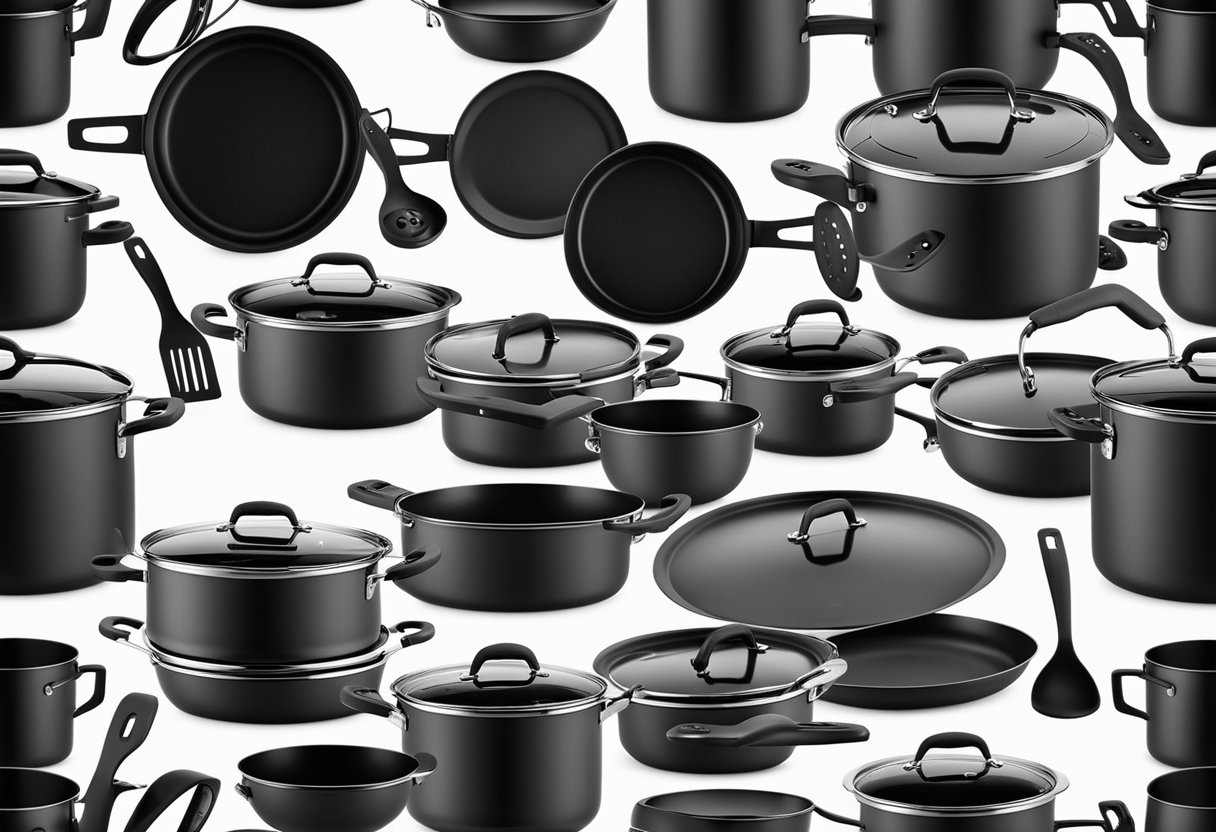
When it comes to cookware, the cost and value of hard anodized cookware can vary widely. Hard anodized cookware is typically more expensive than other types of cookware, such as stainless steel or non-stick, but it is also more durable and long-lasting.
The cost of hard anodized cookware can range from moderate to very expensive, depending on the brand, quality, and number of pieces in the set.
Some high-end hard anodized cookware sets can cost upwards of $500 or more. However, there are also more affordable options available, with sets ranging from $100 to $300.
When considering the value of hard anodized cookware, it’s important to take into account its durability and longevity. Hard anodized cookware is known for its ability to withstand high heat and resist scratches and dents.
This means that it can last for many years with proper care and maintenance, making it a worthwhile investment for many home cooks.
While hard anodized cookware is not typically induction compatible, there are some brands that offer induction-compatible options.
These sets are usually more expensive than non-induction compatible sets, but they offer the added convenience of being able to use them on induction cooktops.
Overall, the cost and value of hard anodized cookware will depend on your individual needs and preferences.
If you’re looking for a durable and long-lasting cookware set that can withstand high heat and resist scratches and dents, then hard anodized cookware may be a good investment for you. However, if you’re on a tight budget or prefer a different type of cookware, then it may not be the best option for you.
Cooking with Hard Anodized Cookware
As someone who loves to cook, I have found that hard anodized cookware is an excellent choice for many recipes.
Not only is it durable and scratch-resistant, but it also conducts heat well, making it perfect for sautéing and searing. However, one question that often arises is whether hard anodized cookware is induction compatible.
The answer to this question is not straightforward. While hard anodized cookware is not inherently magnetic, some manufacturers have addressed this issue by adding a layer of magnetic material to the base of the pots and pans. This allows the cookware to be used on induction cooktops.
It is important to note that not all hard anodized cookware is induction compatible. If you are in the market for new cookware and plan to use it on an induction cooktop, be sure to look for cookware that is specifically labeled as induction compatible.
When cooking with hard anodized cookware, it is important to use the right type of cooking surface. Hard anodized cookware is not suitable for use on glass or ceramic cooktops, as it can scratch the surface. Instead, it is best to use it on gas or electric stovetops.
One of the great things about hard anodized cookware is that it comes in a variety of shapes and sizes, making it suitable for a wide range of recipes.
Whether you are making rice in a stockpot, sautéing vegetables in a skillet, or simmering a sauce in a saucepan, you can find a hard anodized cookware option that will work for you.
Another benefit of hard anodized cookware is that it often comes with a nonstick coating, which makes cooking and cleaning up a breeze. However, it is important to use the right utensils when cooking with nonstick pans to avoid scratching the surface.
Overall, I have found that hard anodized cookware is a great choice for anyone who loves to cook. While it may not be suitable for use on all cooking surfaces, it is durable, scratch-resistant, and conducts heat well, making it a versatile and reliable option for many recipes.
Frequently Asked Questions
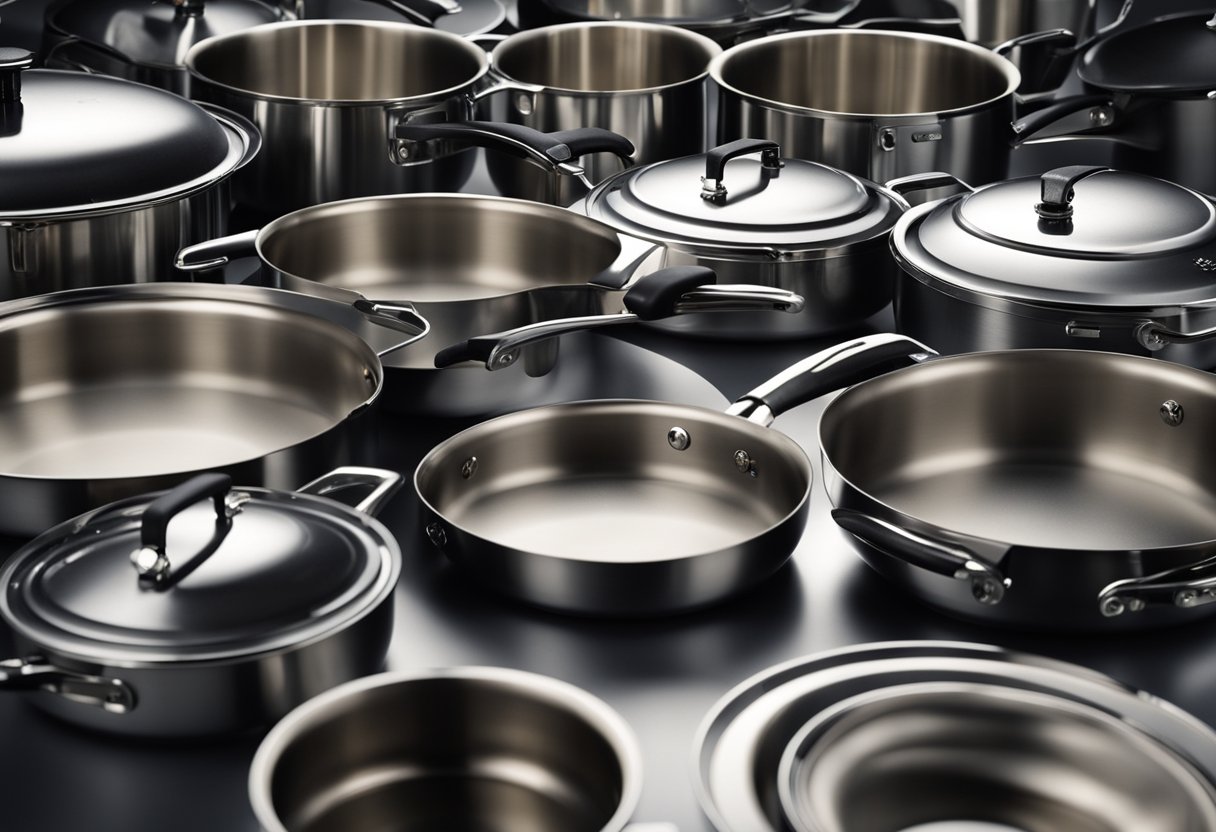
What types of cookware are compatible with induction cooktops?
Induction cooktops work by using an electromagnetic field to heat the cookware directly, rather than heating the air around it.
Therefore, only cookware made with magnetic materials can be used on induction cooktops. Examples of magnetic materials include cast iron, stainless steel, and some types of aluminum.
What are the benefits of using hard anodized cookware?
Hard anodized cookware is known for its durability, resistance to scratches and dents, and even heating. It is also lightweight and easy to clean, making it a popular choice for many home cooks.
Can hard anodized cookware be used on an induction cooktop?
Most hard anodized cookware is not compatible with induction cooktops because the materials used to make it are not magnetic.
However, some manufacturers have started producing hard anodized cookware that is specifically designed to work on induction cooktops. It is important to check the packaging or product specifications to ensure that the cookware is compatible with induction cooktops before purchasing.
What are the best brands of induction cookware?
Some of the best brands of induction cookware include All-Clad, T-fal, and Cuisinart. These brands offer a range of cookware made with magnetic materials that are compatible with induction cooktops.
Are there any disadvantages to using hard anodized cookware?
One potential disadvantage of using hard anodized cookware is that it is not dishwasher safe. Additionally, some people may prefer the look of other types of cookware, such as stainless steel or copper.
Does hard anodized cookware work well with non-stick coatings?
Yes, many types of hard anodized cookware feature non-stick coatings that make cooking and cleaning easier. However, it is important to note that these coatings can wear off over time and may need to be replaced.





